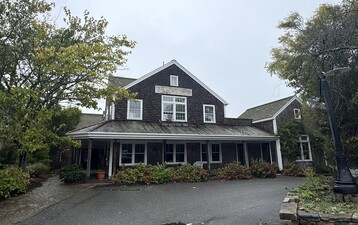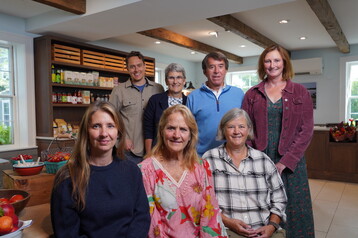Land Bank, Nourish Nantucket Close On Food Security Hub For $6.5 Million
JohnCarl McGrady •

Nourish Nantucket and the Nantucket Land Bank have closed on their collaborative purchase of a Boynton Lane property that will serve as a food security hub for the island, officially ending months of uncertainty surrounding the future of the Nantucket Food Pantry.
The new building will allow the Food Pantry to expand, and it provides a long-term central location for Nourish Nantucket’s food security efforts. It will also provide housing for the Land Bank and a commercial processing facility for donated venison that can be given to islanders in need.
Announced earlier this month, the purchase comes even as a potential federal suspension of the Supplemental Nutrition Assistance Program (SNAP) looms, and local food security non-profits rally to fill the gap that will be left if food stamps don’t go out on November 1st.
Leaders of both Nourish and the Land Bank have suggested that in the future, the building could host even more programs related to food security.
“It's a game-changer,” Nourish Nantucket board president Brooke Mohr said. “I think the absolute coolest part of this is the collaboration and the fact that all of this is tied together in such an intentional way, which is Nourish's whole purpose in being.”
The property at 17, 19 and 21 Boynton Lane was purchased for $6.5 million. Nantucket Land Bank executive director Rachael Freeman told the Current that $5.5 million came from the Land Bank, which will own 60 percent of the building, and the other $1 million came from Nourish Nantucket, which will own the remaining 40 percent.
The Land Bank’s involvement in the purchase has drawn particular interest, as land acquired using the revenue from the two percent transfer fee it collects on real estate transactions must be dedicated to open space, recreation, or agricultural uses.
The Land Bank contends that the processing of donated venison, which could eventually expand to other meat products, qualifies as an agricultural use.
“For years, the Land Bank has worked toward establishing on-island meat processing capabilities to support local agriculture,” the Land Bank wrote in a statement. “With the growing deer population and heightened local concern, creating a local processing site will help manage herd size while supporting food distribution for residents in need.”
It is perhaps the most notable example yet of the Land Bank’s new approach to purchasing land, which Land Bank commissioners have said will involve “transitioning away from a purely open space acquisition mode.”
At first, the building’s tenants will share ownership of the whole building, but they hope to move to a condominium-style ownership structure, where each organization owns the portion of the building it is using, with shared common spaces.
Nourish Nantucket will use offices on the second floor, with the Food Pantry stationed on the first floor. The Land Bank will use the basement for deer processing and operate the two apartments on the site.
“The importance of this acquisition in working toward solving the food insecurity issue on Nantucket cannot be overstated,” Nourish Nantucket Advisory Council chair Bruce Percelay said. “This is indeed a game-changer.”
Mohr said she has been eyeing the property for years, but it wasn’t until the Land Bank stepped in that the acquisition was possible.
“It was really the partnership with the Land Bank that brought this to the finish line,” she said. “These things are not simple, but it's really important. It's really important for the lack of duplication, efficiency, but also just being able to expand programming with shared resources.”

One of the programs that will be expanding is the Nantucket Food Pantry. After months of uncertainty surrounding the island nonprofit following the town of Nantucket’s decision not to renew its lease at its current location on Washington Street, the Food Pantry now has a permanent home located centrally in the mid-island area, less than one-tenth of a mile from a bus stop. The Boynton Lane location also comes with a commercial kitchen. In many ways, it’s the ideal home for the Food Pantry.
Founded in 1991, the Food Pantry has long been the face of food aid on Nantucket, providing a critical lifeline to thousands of Nantucket residents. The Food Pantry is now part of Nantucket Food, Fuel and Rental Assistance, which, in turn, is run by the Nantucket Interfaith Council.
Even before the town had made clear that the Food Pantry would lose the Washington Street location to accommodate an expansion of the Nantucket Regional Transit Authority next spring, the Food Pantry had been searching for a more suitable location for its operations, somewhere less cramped that could allow for greater size and more dignity for customers.
There are still some permits that need to be obtained before all of the operations slated for the new building can get underway, but Mohr said Nourish Nantucket hopes to move through the process as quickly as possible.
Other food security programs Nourish promotes include Nourish Nantucket grocery cards redeemable at Stop and Shop, prepared meal distribution efforts, Pip and Anchor’s “Send it Box” program, and organizations including Women, Infants and Children, Meals on Wheels, Salt Marsh Senior Dining, the Warming Place, Sustainable Nantucket’s Farmers Market, Nantucket Public Schools Universal Free Lunch, Our House's meals program, and the Family Resource Center's food security efforts.
For its part, in addition to the apartments, the Land Bank is focused on a custom butchery tailored for venison production in the building’s basement. The butchery concept has been recently pushed by the ACK Deer Management Project, and in theory would allow Nantucket to massively increase its involvement with MassWildlife’s Hunters Share the Harvest program, through which hunters can donate venison to those in need. The Land Bank announced earlier this month that it was joining the program with the creation of a butchery tailored for venison production.
Later, they announced they would be hiring a full-time seasonal staff member to oversee the butchery.
Past efforts to process deer for the program have been limited by the lack of a dedicated commercial facility and staff. The Land Bank’s efforts could change that. Essentially every major player in the island’s fight against food insecurity has spoken in favor of the program, which could provide as many as 75,000 meals for island residents every year.
Deer cause massive damage to local ecosystems, are notorious disease vectors, routinely prove a nuisance to local landscapers and gardeners, and are a danger to drivers.
And yet, the herd is only growing. The latest estimate from the state suggests there are 10,000 deer on Nantucket, and if nothing changes, that’s the floor. For reference, the state’s guidelines suggest that a healthy population of deer on Nantucket would be approximately one-tenth of the current population, at around 900 deer.
A facility like the one on Boynton Lane could be what is needed to turn the corner in Nantucket’s fight against deer overpopulation.
In their statement, the Land Bank also wrote that “the Land Bank may now apply for a deer damage permit under the agricultural component of its Act. Obtaining this permit from MassWildlife will enable the organization to remove deer from designated properties outside of the traditional hunting season – something previously unauthorized due to the lack of a local processor.”
The Land Bank has discussed deer damage permits at several recent meetings, and the majority of the commission seems to favor them.